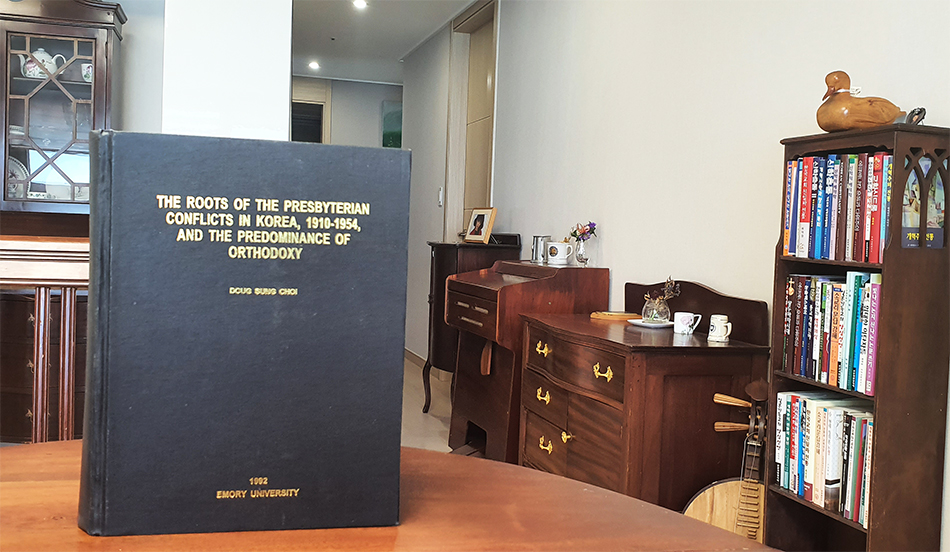
THE ROOTS OF THE PRESBYTERIAN CONFLICTS IN KOREA, 1910-1950
Doctor of Philosophy, Dissertation
DOUG CHOI
EMORY UNIVERSITY, 1992
PREFACE
In the 1920s, Dr. George L. Paik published his Yale dissertation, The History of the Protestant Mission in Korea 1832-1910,1 which has provided important historical resources for the period up to 1910. We examine the history of the Korean Christianity 1910-1960, focusing on conflicting Presbyterianism from historical, philosophical and theological perspectives. In this period, Korea experienced serious national and ecclesiastical controversies, and the character and direction of the Korean Christianity were molded.
A crucial question raised in the study of the contemporary Korean Christianity is why 'fundamentalistic' beliefs have come to predominate, especially in the Presbyterian circle. It is known that Korean Presbyterians in general are conservative, some of them are very conservative, and some others are extremely conservative. They are conservative to Reformed faith and tradition.
While the great majority of Presbyterian churches in most parts of the world has been gradually accommodated to modern developments and no longer hold the convictions of earlier decades, the great majority of Korean Presbyterians can still be characterized as 'orthodox' or stern Calvinists. This work presents cultural and historical reasons for the loss of authority and credibility of those who, in the Korean context, championed modern developments and for the continuing domination in Presbyterianism by the orthodox/conservative wing.
Cultural superiority of the Western perspectives has led some historians to see the history of the Korean church principally as a 'history of mission.' Under the influence of this view, for example, the miraculous church growth in Korea has been attributed to the Nevius Mission Method, which emphasized the Bible, and the strong conservative tendency is interpreted as the fruit of the missionaries who planted and molded the faith of the church during its early period. In a similar tone, other historians have simplified the history of the Korean church to that of theological thought: liberalism and conservatism.
The nationalistic approach is an alternative accentuating the role of the Koreans. The Minjung approach, similarly, weights the peoples' role in church history. Both approaches emphasize the particularity of Korean Christianity but fail to examine the universality of the church in its catholic and confessional nature and tend to be tied to a subjective and chauvinistic interpretation of history. All of these approaches, eventually, arrived at partial or superficial answers to the questions raised in the Korean church.
The Church of Jesus Christ exists in this world in a particular context that must be examined for its historical, cultural, national, institutional, political, regional, and sometimes psychological setting. The church exists in the world but is not of the world. The confessional and spiritual reality of the church transcends the boundaries of particularity. It is a universal and confessional community based upon faith in God the Father, the Son, the Holy Spirit, and Scripture and, accordingly, needs theological and biblical consideration.
To provide a balanced interpretation and clarification of the principles, power, and operating spirit flowing behind the history, I attempted an integrated approach; esteemed the particularity and universality of the church; and focused on the historical, philosophical, and theological aspects. I endeavored to see how the Church and Christians responded to what God wanted according to the principal teachings of Scripture: what the human being is to believe concerning God and what duty God requires of the human being.
I would like to express my sincere appreciation to the faculty members who have shaped my knowledge, academic insight, and critical thinking. Grateful acknowledgment is due to the Reformed Theological Seminary, Yale University, and Emory University, which have offered scholarships and stipends during my academic years. Library staffs of many institutions have answered my queries and made available important resources. My father and mother, my wife, Paul Pyunghwa, G-Heh Esther, and Hankook Moses, deserve special appreciation.
For the book titles quoted in Korean and other oriental languages, I have used the English equivalents. The bibliography includes the titles in their original languages.
Doug Choi
Korea Theological Seminary, Kosin University
Chonan, Korea
<저작권자 ⓒ 리포르만다, 무단 전재-재배포-출처 밝히지 않는 인용 금지>
▶ 아래의 SNS 아이콘을 누르시면 많은 사람들이 읽을 수 있습니다.
 종교개혁전야
종교개혁전야
 THE CONLICTS IN THE VIEWS OF THE BIBLE, PCK
THE CONLICTS IN THE VIEWS OF THE BIBLE, PCK












